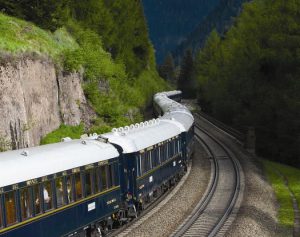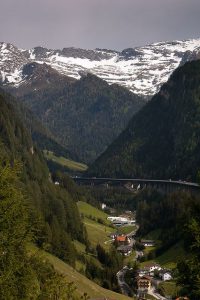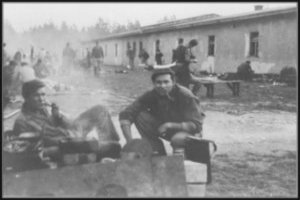We were in a marshalling yard, and ominously we were formed into a queue to be briefly interrogated. The questioners wore civilian clothes and were obviously members of the Gestapo, of whom we had heard but never seen. The questions were quite simple, “What is your name and number? What was your job in the Army?” and “What was your job before you were a soldier?” Although we could not be compelled to answer the second and third questions, most of us deemed it wise to do so. When it came to my turn and I answered “school teacher” to the third question, the Gestapo agent looked at me with some contempt and said, “No use to the Reich’, and I was put in an ever-growing queue of men who seemingly were not wanted. Those with trades such as electricians or plumbers were put into a separate queue, and those who had been tank-crew were further segregated. I had now had the unique distinction of having being rejected by both sides, because I was a school-master. I began to feel that there was some quirk in human nature that made men instinctively oppose those who were put in authority over them whilst they were young.
One man with whom I was to be associated later answered, “Professional Singer” to the question on “What did you do before you became a soldier?” The Gestapo agent put down his pen and said, “Very well – then sing.” Without hesitation the soldier, who was called Frank Kennard, began a piece from ‘La Bohème in a most attractive tenor voice. After listening for a couple of minutes the Gestapo agent joined in the applause and then said, “No use to the Reich”, and Frank joined our queue. We were then put back in to our cattle trucks and after a while began to move northwards.


We did not realise it but we were heading for the Brenner Pass and then in to Germany. At least we could not complain about the scenery which we could see occasionally through the small grills. We passed through Bolzano and came to the Brenner. The train stopped suddenly, and to our horror we heard the drone of aircraft and the sound of falling bombs. We were now being bombed by our own side. The German guards jumped from the tops of the trucks and from their platforms and rushed in to the forests nearby. They did not, however, open the doors of the cattle trucks so we were left to pray that we were not hit. I managed to stick my head through one of the ventilation grills and I was able to see another head sticking out from the truck in front. This belonged to another soldier I had come to know well and who had been a general manager for a branch of Woolworths on the south coast of England. He looked at the sky and the burning trees around and calmly said, “Never a dull moment, old boy.” He restored some of my faith in the ability of the British to endure. Fortunately no truck was hit, and as the planes disappeared so the train re-started. We passed the border and were allowed off the train at Rosenheim in order to get water and use the lavatories. This raised our morale, and we began to feel that perhaps P.O.W. life in Germany would not be so bad after all. How wrong we were!

We were at the beginning of a period where staying alive was a question of luck, and some of our number would not survive. We eventually detrained at Moosburg, which was just south of Munich. We were marched to a huge prison camp over whose gates were the chilling words, “Arbeit Macht Frei”*. As we had not worked in Italy, the idea of “Arbeit” did not recommend itself to us. There were many nationalities in the camp, and it was in the shower and de-lousing block that I met my first Russian. He was in charge of the showers, and he came from Omsk. Like many of his compatriots he had no idea that the British were his allies and regarded us with the greatest suspicion.
The camp was a miserable place. There were guards everywhere, mostly with very fierce dogs and armed to the teeth. The rations were meagre – one piece of black bread and a bowl of thin soup each day, and we were paraded and counted at frequent intervals. Some of these parades took many hours and were held in all weathers. We often returned to our huts very wet and bedraggled to try to dry out around the single stove, which each hut contained. We longed to be away from this awful place.
*It’s not clear whether Moosburg, which was the biggest POW camp in Germany, had the Arbeit Macht Frei sign above the gate or if this is one of Dad’s later misrememberings.